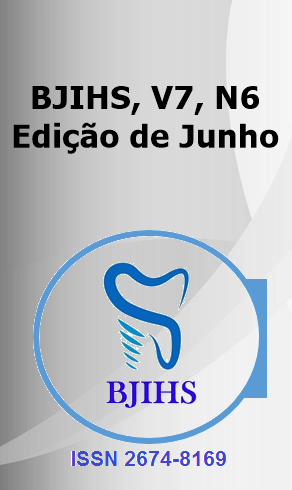Resumo
Periimplantitis is the most common biological complication on implant dentistry. Its prevalence is estimated of 20% of the successfully osseointegrated implants. The treatment of this complication has been a subject of great discussion in the past years. It is well accepted that non-surgical treatment has little or no effectiveness on stopping progressive bone loss and surgical treatment might be mandatory to achieve disease control. Some authors have proposed the use of Guided Bone Regeneration to regain the bone lost due to disease progression, similarly to periodontal regenerative therapies. Recently, the use of a minimally invasive surgical technique has shown promising regenerative results, without the use of biologics. The aim of this case report is to describe the use of a minimally invasive surgical technique to treat progressive bone loss around implant. A 68-year-old Caucasian female with deep pocket and infrabony defect on an implant at #14 region was treated with a minimally invasive surgical flap and decontamination with antimicrobial photodynamic therapy after removal of provisional restoration. Primary closure was achieved with 6-0 polypropylene sutures, and the healing process was uneventful, and radiographic outcomes were favorable up to 12 months. This case report shows that good regenerative outcomes can be achieved when primary closure, minimal invasiveness, and tissue stability are achieved by a surgical technique.
Referências
Caton JG, Armitage G, Berglundh T, Chapple ILC, Jepsen S, Kornman KS, et al. A new classification scheme for periodontal and peri-implant diseases and conditions – Introduction and key changes from the 1999 classification. J Periodontol. 2018;89 Suppl 1:S1–8. doi:10.1002/JPER.18-0157
Derks J, Schaller D, Hakansson J, Wennstrom JL, Tomasi C, Berglundh T. Peri-implantitis – onset and pattern of progression. J Clin Periodontol. 2016;43:383–8. doi:10.1111/jcpe.12535
Moreira AL, Novaes AB Jr, Grisi MF, Taba M Jr, Souza SL, Palioto DB, et al. Antimicrobial photodynamic therapy as an adjunct to non-surgical treatment of aggressive periodontitis: a split-mouth randomized controlled trial. J Periodontol. 2015;86:376–86. doi:10.1902/jop.2014.140392
Staubli N, Walter C, Schmidt JC, Weiger R, Zitzmann NU. Excess cement and the risk of peri-implant disease – a systematic review. Clin Oral Implants Res. 2017;28:1278–90. doi:10.1111/clr.12954
Schwarz F, Sahm N, Schwarz K, Becker J. Impact of defect configuration on the clinical outcome following surgical regenerative therapy of peri-implantitis. J Clin Periodontol. 2010;37:449–55. doi:10.1111/j.1600-051X.2010.01540.x
Ramos UD, Suaid FA, Wikesjo UME, Susin C, Taba M Jr, Novaes AB Jr. Comparison between two antimicrobial protocols with or without guided bone regeneration in the treatment of peri-implantitis: a histomorphometric study in dogs. Clin Oral Implants Res. 2017;28:1388–95. doi:10.1111/clr.12998
Aslan S, Buduneli N, Cortellini P. Clinical outcomes of the entire papilla preservation technique with and without biomaterials in the treatment of isolated intrabony defects: a randomized controlled clinical trial. J Clin Periodontol. 2020;47:470–8. doi:10.1111/jcpe.13255
Susin C, Wikesjo UM. Regenerative periodontal therapy: 30 years of lessons learned and unlearned. Periodontol 2000. 2013;62:232–42. doi:10.1111/prd.12003
Schwarz F, Sculean A, Bieling K, Ferrari D, Rothamel D, Becker J. Two-year clinical results following treatment of peri-implantitis lesions using a nanocrystalline hydroxyapatite or a natural bone mineral in combination with a collagen membrane. J Clin Periodontol. 2008;35:80–7. doi:10.1111/j.1600-051X.2007.01168.x
Htet M, Madi M, Zakaria O, Miyahara T, Xin W, Lin Z, et al. Decontamination of anodized implant surface with different modalities for peri-implantitis treatment: lasers and mechanical debridement with citric acid. J Periodontol. 2016;87:953–61. doi:10.1902/jop.2016.150615
de Waal YC, Raghoebar GM, Huddleston Slater JJ, Meijer HJ, Winkel EG, van Winkelhoff AJ. Implant decontamination during surgical peri-implantitis treatment: a randomized, double-blind, placebo-controlled trial. J Clin Periodontol. 2013;40:186–95. doi:10.1111/jcpe.12034
Harrel SK, Rees TD. Granulation tissue removal in routine and minimally invasive procedures. Compend Contin Educ Dent. 1995;16:960, 962, 964 passim.
Cortellini P. Minimally invasive surgical techniques in periodontal regeneration. J Evid Based Dent Pract. 2012;12:89–100. doi:10.1016/S1532-3382(12)70021-0
Cortellini P, Tonetti MS. A minimally invasive surgical technique with an enamel matrix derivative in the regenerative treatment of intra-bony defects: a novel approach to limit morbidity. J Clin Periodontol. 2007;34:87–93. doi:10.1111/j.1600-051X.2006.01020.x
Aslan S, Buduneli N, Cortellini P. Entire Papilla Preservation Technique: a novel surgical approach for regenerative treatment of deep and wide intrabony defects. Int J Periodontics Restorative Dent. 2017;37:227–33. doi:10.11607/prd.2584

Este trabalho está licenciado sob uma licença Creative Commons Attribution 4.0 International License.
Copyright (c) 2025 João Pedro Oliveira de Batista, Jefferson David Melo de Matos, Valdir Cabral Andrade, Tales Cyríaco Morais, Daniela Nascimento Silva, Sergio Henrique Lago Martins, Gustavo Henrique Apolinário Vieira, Umberto Demoner Ramos
